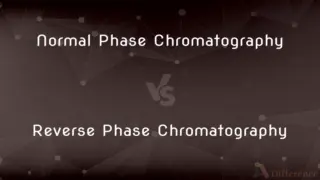Object in English Grammar vs. Complement in English Grammar — What's the Difference?
Edited by Tayyaba Rehman — By Fiza Rafique — Published on December 12, 2023
In English grammar, an object receives the action of a verb, while a complement completes the meaning of a subject, verb, or object.

Difference Between Object in English Grammar and Complement in English Grammar
Table of Contents
ADVERTISEMENT
Key Differences
In English grammar, an object refers to the entity that is acted upon by the verb. On the other hand, a complement provides more information or completes the meaning of a subject, verb, or object within the sentence.
For instance, in the sentence "She reads the book," "the book" is the object because it's what's being read. In "She is a doctor," "a doctor" is the complement because it provides more information about "She."
Both objects and complements play pivotal roles in giving sentences clarity and depth. While an object answers questions like "whom?" or "what?" in relation to the verb, a complement answers questions like "what kind of?" or "which one?".
It's worth noting that not all sentences require both an object and a complement. For instance, "She sings" has neither a clear object nor a complement. Meanwhile, "I find him interesting" has "him" as the object and "interesting" as the complement.
To further understand the distinction, consider the sentence "I call her my friend." Here, "her" is the object of the verb "call," and "my friend" is the complement that gives more information about "her."
ADVERTISEMENT
Comparison Chart
Function
Receives the action of a verb
Completes or provides additional information
Answers the Questions
Who? Whom? What?
What kind? Which one? How?
Dependency
Directly related to the verb
Relates to the subject, verb, or object
Example Sentence
"She reads books." (books is the object)
"She is a teacher." (a teacher is the complement)
Presence in a Sentence
Not all sentences have objects
Not all sentences have complements
Compare with Definitions
Object in English Grammar
Can be direct or indirect.
He gave her a gift. (gift is the direct object, her is the indirect object)
Complement in English Grammar
Completes the meaning or sense of a subject or verb.
They made her captain. (captain is the complement)
Object in English Grammar
Directly related to the action verb.
The audience applauded the performer. (performer is the object)
Complement in English Grammar
Can be noun phrases, adjective phrases, or adverbial phrases.
The sky turned dark. (dark is the complement)
Object in English Grammar
Can be nouns, pronouns, or noun phrases.
I saw him at the park. (him is the object)
Complement in English Grammar
Provides additional information about the subject, verb, or object.
She is talented. (talented is the complement)
Object in English Grammar
Answers the questions "whom?" or "what?" in relation to the verb.
She loves chocolate. (chocolate is the object)
Complement in English Grammar
Can be subject, object, or verb complements.
It is she who won the prize. (she is the subject complement)
Object in English Grammar
The receiver of the action in a sentence.
The cat chased the mouse. (mouse is the object)
Complement in English Grammar
Often follows linking verbs.
The cake smells delicious. (delicious is the complement)
Common Curiosities
What types of words can serve as objects?
Objects can be nouns, pronouns, or noun phrases.
Are complements exclusive to linking verbs?
While complements often follow linking verbs, they can also relate to transitive verbs and objects.
What is the main function of an object in a sentence?
An object in English grammar receives the action of the verb.
Is the object always necessary in a sentence?
No, not all sentences require an object, such as "She sings."
Can a sentence have both an object and a complement?
Yes, for example, "I find the movie interesting," where "movie" is the object and "interesting" is the complement.
Can adverbs serve as complements?
Yes, especially when providing more information about the verb, as in "He runs quickly," where "quickly" is the adverbial complement.
Is the object affected by the verb's tense?
No, the verb's tense affects the action but not the object itself.
How do I identify a complement in a sentence?
Look for words or phrases that provide additional information about the subject, verb, or object without being the main receiver of the action.
Can a complement be at the beginning of a sentence?
Yes, especially in cases of inversion for emphasis or stylistic reasons, like "Talented is she."
How does a complement enhance a sentence?
A complement in English grammar completes or provides additional information about the subject, verb, or object.
Can a sentence have multiple objects?
Yes, especially with verbs that take both a direct and an indirect object, like "She gave him a book."
Is the prepositional object the same as the object?
No, while both relate to verbs, prepositional objects follow prepositions in prepositional phrases.
Can pronouns serve as complements?
Yes, for example, "It is she," where "she" is the subject complement.
Can the complement and object be the same in a sentence?
Rarely. Usually, the object receives the verb's action, while the complement provides additional information.
Do all verbs require an object?
No, only transitive verbs take objects, while intransitive verbs do not.
Share Your Discovery

Previous Comparison
Normal Phase Chromatography vs. Reverse Phase Chromatography
Next Comparison
Individual Demand vs. Market DemandAuthor Spotlight
Written by
Fiza RafiqueFiza Rafique is a skilled content writer at AskDifference.com, where she meticulously refines and enhances written pieces. Drawing from her vast editorial expertise, Fiza ensures clarity, accuracy, and precision in every article. Passionate about language, she continually seeks to elevate the quality of content for readers worldwide.
Edited by
Tayyaba RehmanTayyaba Rehman is a distinguished writer, currently serving as a primary contributor to askdifference.com. As a researcher in semantics and etymology, Tayyaba's passion for the complexity of languages and their distinctions has found a perfect home on the platform. Tayyaba delves into the intricacies of language, distinguishing between commonly confused words and phrases, thereby providing clarity for readers worldwide.












































